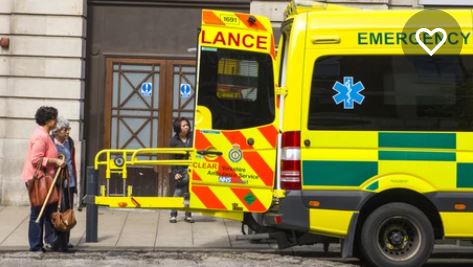
When you are a patient in hospital, have an appointment there, or are taken to Accident & Emergency, it can be even more scary alone. Having a close family member, close friend, carer or personal assistant with you is possible under COVID. There is official NHS guidance on this, document reference C1112.
Who you can bring or have visit you, is defined as “somebody important to the patient”. This is at the discretion of the hospital, the hospital can say yes or no. But they should take account of the needs of the patient. They can’t say no visitors are allowed at all.
If you are going to hospital, it’s a good idea to have the NHS guidance ready to show on your phone or print page 1 and put it in your coat pocket or bag in case of emergency, or write down the title. The full guidance is here:
Visiting healthcare inpatient settings during the COVID-19 pandemic: principles
16 March 2021, Version 2. Document reference: C1112.
Thanks to disabled campaigners like Fleur Perry and relatives who have pressed for our right to have someone with us, NHS England had to change its ban on hospital visits to disabled patients as it discriminated against people with support and communication needs. Including people who need continuous assistance by someone who knows what to do, assistance which is not going to be done by hospital staff.
NHS England also recently made a statement: ‘The national suspension on visiting imposed under [previous] guidance is now lifted and visiting shall instead be subject to local discretion by trusts and other NHS bodies.‘
One close person is allowed to be with the patient, or both parents or guardians as long as they are in the same family bubble.
This is the list of situations, who and when visitors can be allowed:
- patient receiving end-of-life care
- partners of women requiring support through antenatal and scan attendances, induction of labour, during labour, as well as in the postnatal period
- a familiar carer/parent or guardian/supporter/personal assistant
- patients may be accompanied where appropriate and necessary to assist their communication and/or to meet their health, emotional, religious or spiritual care needs.
The guidance also applies to your outpatient appointment, going for a scan or test, and Accident & Emergency:
“These principles can also be applied in outpatient and diagnostic service settings and the emergency department where the patient may be accompanied by one close family contact, or somebody important to the patient, to support the patient with complex/difficult decision-making.”
During COVID, women have been pressured to make decisions about serious and invasive treatment quickly. Having someone with you helps make space for your concerns or questions you may have.
Patients whose first language is not English, who want someone with us to translate, can raise our communication needs and emotional needs — these are covered in the NHS guidance. In this situation, you can say that the close family member or close friend should be there to help you understand your medical treatment. It’s your choice to decide about treatment — to give proper informed consent, to decide not to go ahead or say you want to think about it.
In addition to NHS guidance, there are laws which apply:
- Reasonable adjustments for disabled people, under the Equality Act 2010.
What is the reasonable adjustments duty? Public authorities and service providers have a duty to disabled people to make reasonable adjustments to the way they do things, if that puts disabled people at a disadvantage. This duty is in the Equality Act 2010. (Citizens Advice Bureau leaflet)
- The rights of patients to be accompanied or have visitors under the Human Rights Act 1998 – Article 8: Respect for your private and family life. More info here.
Assistance dogs
Disabled nurse Bethann Siviter sent a legal letter to Birmingham City Hospital when she was banned from bringing her assistance dog to an appointment. Instead she was forced to rely on her husband, who is himself Clinically Extremely Vulnerable. She was advised by solicitor Chris Fry.
See report by Disability News Service: Hospital facing court action after banning assistance dog
Discover more from WinVisible
Subscribe to get the latest posts sent to your email.

So Kerion you know your rights for Adore.
Virus-free. http://www.avg.com
My son who is 33 years old he had to go to the hospital on the 25th commencing the 26of april 2021he had got puneoma I am is dad and they told me that I was not allowed to go with him because of covid-19 my son can’t walk or talk he is wheelchair bound my self and carer have to do everything for him I have been told that I can sue the hospital for neglect discriman against the disabled
Dear Stephen Jordan,
Sorry to hear about this. Have you told the staff there was a change in NHS policy in March? What about contacting your MP saying that the hospital is contravening the NHS guidance, document reference C1112. If you have been referred to a solicitor who can write a legal letter about compliance with the policy, go ahead. Best wishes, WinVisible